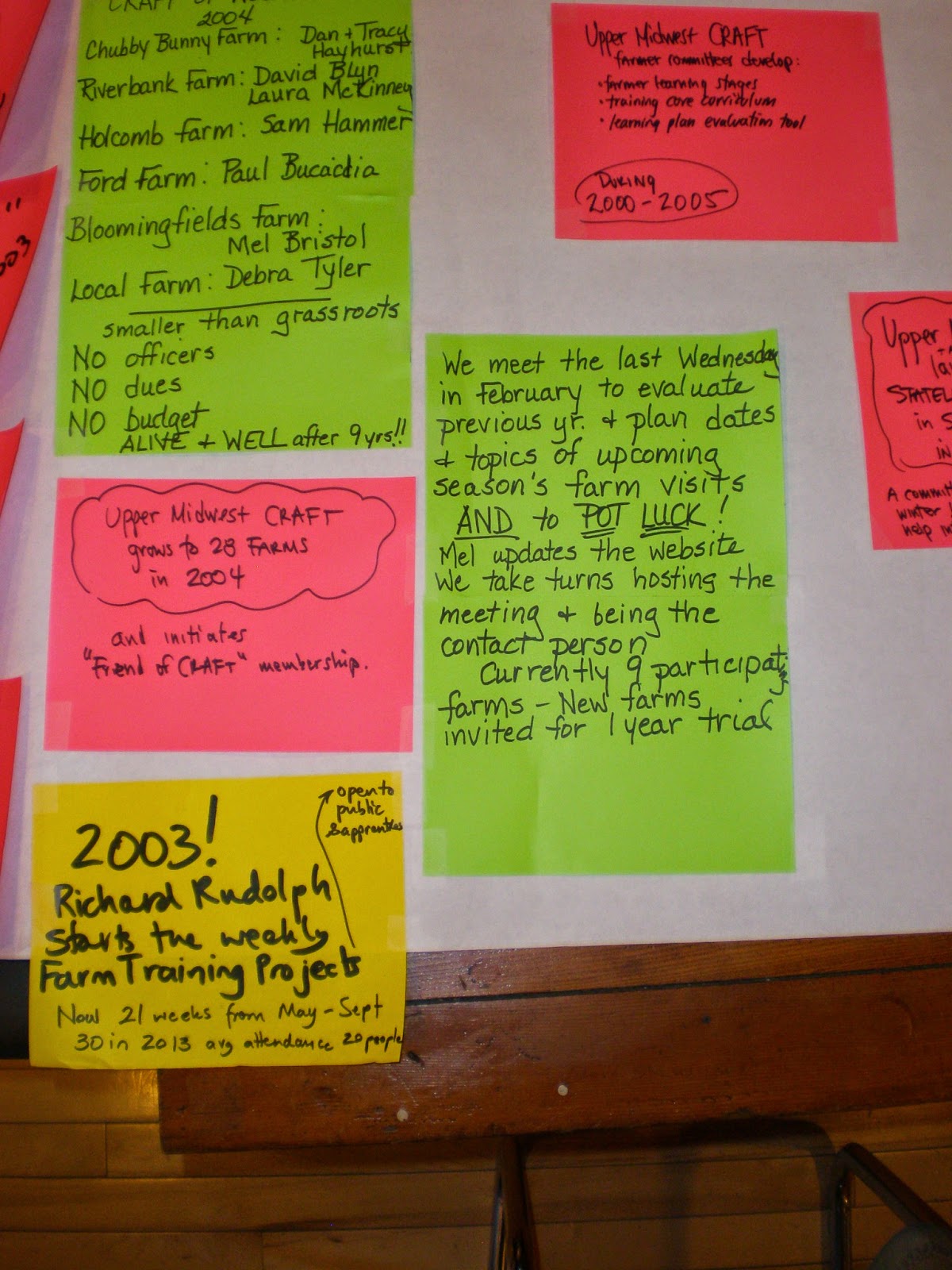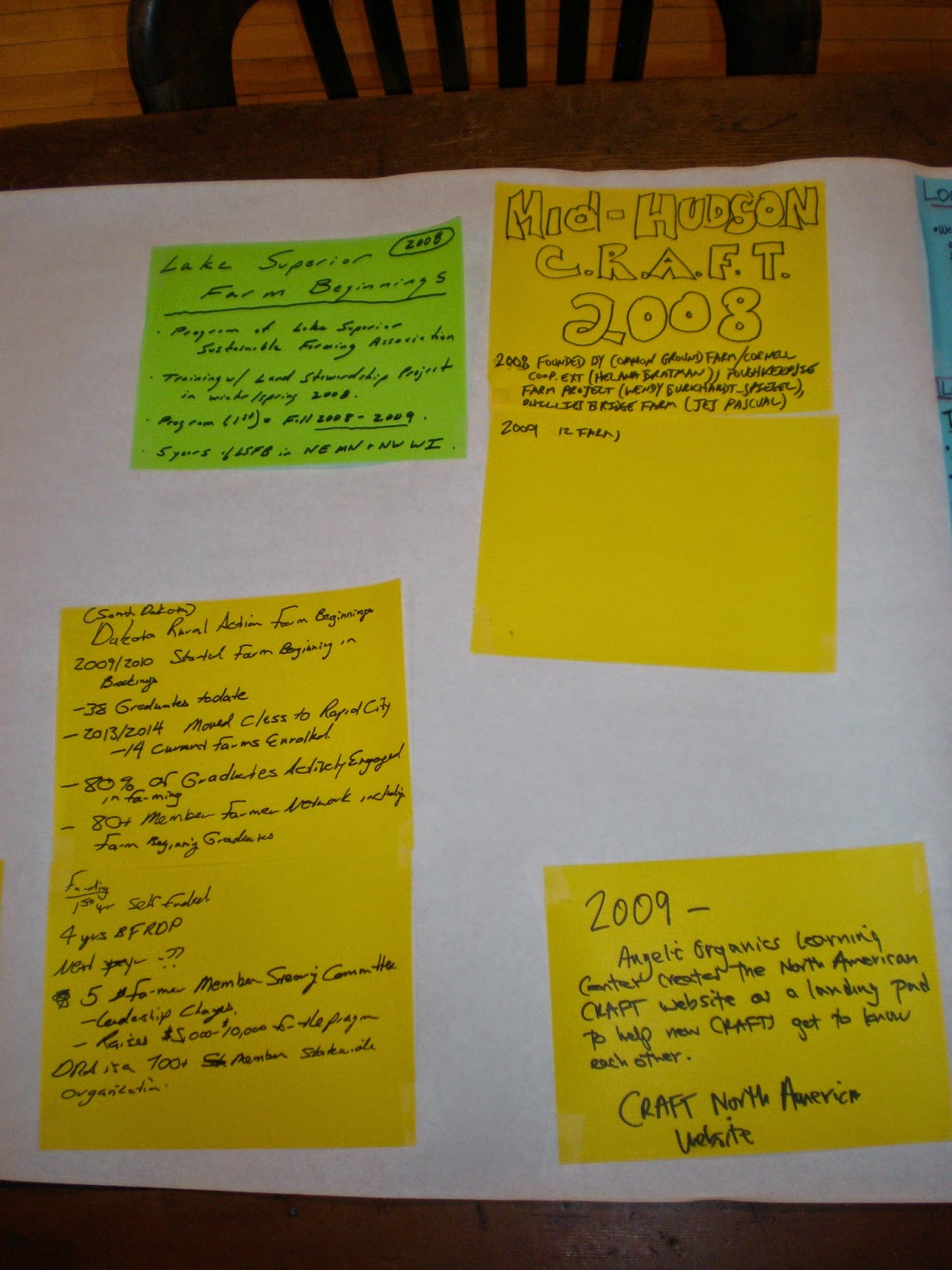Educational materials for interns and farmers
Existing textbooks were found too specific for an intern that is completely new to the world of farming: interns require a full overview of the basic farming knowledge in laymen terms (equipments, soils, etc). On the initiative of the two instigators, a manual was first drafted as part of a master thesis with the support of a small grant, and member farmers edited and expanded the text. With a second grand hosted by the Ignatius Jesuit Centre in 2008, a second edition was developed and expanded with timely topics like organic certification. With that grant, Ignatius also developed a manual for farmers, Nurturing new farmers, based on the questions that farmers posed about hosting farm internships and managing employees. The manual also received inputs from a number of experienced C.R.A.F.T. farms. Contributing farmers received a small honorarium and several copies in compensation for their efforts. Both books are continued to be publicized and sold by the Ignatius Jesuit Centre at printing costs. A new edition is expected to be finished in Winter 2014/5 and will also be published online.
All farmers are expected to own a copy of both manuals. The manual Oh to Grow is popular especially with interns without farming background, because it contains a selection of the most important information and data in text, graphs and tables.
From CRAFT in the Hudson Valley/Berkshires/Pioneer Valley:
Standard Operating Procedures
Jean-Paul Courtens from Roxbury Farm is one of the original founders of the first C.R.A.F.T. group. Roxbury Farm is a community supported farm that grows vegetables, herbs, and grass fed pork, lamb, and beef for over 1000 shareholders representing over 1200 families in four communities–Columbia County, the Capital Region, Westchester County and Manhattan–on 300 acres in Kinderhook, New York (45 acres of vegetable).
Over the years, Jean-Paul has written down many experiences and operating procedures for his approx- imately 15 year-around or seasonal employees and farm intern(s). In his believe that ecological farms should share knowledge openly and widely, Jean-Paul has shared all of these materials with the internet community at http://www.roxburyfarm.com (select "Information for Farmers"), including:
- a 100 Member CSA Plan that breaks down their greenhouse schedule, field planting and seeding schedule, and weekly share plan for a 100 member CSA;
- a description of what Biodynamics means on Roxbury Farm;
- a crop manual describes how they seed, transplant, protect, and cultivate each of our crops;
- a harvest manual describes harvest procedures, ready-to-harvest indicators, packing and washing procedures, and storage conditions. This very detailed description includes time expectations to employees;
- an article that describes a thought process before purchasing a piece of equipment.
- detailed schedules for field planting and seeding and Greenhouse;
- soil fertility practices on Roxbury farm; and
- the whole farm approach to soil and plant health.
From Western North Carolina CRAFT:
Place-based education and growing
The Southern Appalachian are mountainous and often provide a fairly complex landscape with many marginal lands. These areas are adequate for intensive ecological farming, such as organic market gardening, intensive grazing, and diversified mixed farming.
The Southern Appalachian are mountainous and often provide a fairly complex landscape with many marginal lands. These areas are adequate for intensive ecological farming, such as organic market gardening, intensive grazing, and diversified mixed farming.
The C.R.A.F.T. node reflects the specific environmental setting. It regularily shares articles on topics specific for the region, with specific sections on vegetable production, diversified small-scale livestock, integrated systems (rotating pig pasturing with field production), specialized products and on-farm processing. Also, the C.R.A.F.T. farmers (with Organic Growers School) each winter organize two or three round tables on relevant topics where farmers exchange experiences about about intern management, improving internship programs, hiring, but also less immediate topics like new tools, individualized gizmos, and collective sharing of knowledge.
The C.R.A.F.T. group has developed a handbook with over 600 pages, primarily written by member farmers. It offers resources on basic production topics, but also other resources on marketing, employee management, etc. Author farmers received payments for their articles. The compendium also includes resources from other organizations that were included for free use, without additional charge.
The C.R.A.F.T. group has developed a handbook with over 600 pages, primarily written by member farmers. It offers resources on basic production topics, but also other resources on marketing, employee management, etc. Author farmers received payments for their articles. The compendium also includes resources from other organizations that were included for free use, without additional charge.
From The East End of Long Island CRAFT:
Recommended Mentorship Resources from NOFA New York:
From Main Organic Farmers and Gardeners Association (MOFGA):
Recommended resources
- Internships in Sustainable Farming: A Handbook for Farmers, by Doug Jones. (http://mofga.org/Portals/2/Files/internshiphandbook.pdf)
- Farm Internship Curriculum and Handbook: A resource developed by farmers in Oregon, including advice, guidance, and a model curriculum for teaching apprentices farm skills (http://www.attra.org/intern_handbook/index.html).
- The New England Small Farm Institute’s Farm Mentor Project (http://www.smallfarm.org/main/for_on_farm_mentors/)
- Worksheet for prospective apprentice farm visits – what to share about yourself and your farm, and what to ask them (http://mofga.org/Portals/2/Education/interview%20checklist%20for%20farmers.pdf).
A list of all kinds of resources can be downloaded at
http://www.glynwood.org/files/2014/03/CRAFT-resources-2014.pdf
From Western Connecticut CRAFT:
The Western Connecticut CRAFT group has adapted a simple bylaw that is accessible at http://www.bloomingfieldsfarm.com/cft_frameindex.html:
Purpose
CRAFT (Collaborative Regional Alliance for Farmer Training) in Western Connecticut is an organization of farms dedicated to providing farm education and training to its farm apprentices and employees. We do this by organizing farm field meetings which are attended by the apprentices or employees of member farms.
History
The original CRAFT group was organized by farmers in eastern New York and western Massachusetts in 1994. Since that time the concept has become popular nationwide. CRAFT in Western Connecticut was organized in 2004.
Organizational Geography
CRAFT in Western Connecticut farms are located within the boundaries of the Western Connecticut Craft program, which are from the NY/MA borders to Long Island sound, with the eastern border being the Connecticut River.
Member Farms
Member Farms will gather twice a year. The spring meeting will be the last Wednesday in February, and the fall meeting will be the second Wednesday in November. A quorum of two thirds of current participating farms must be present to make changes in the bylaws. Bylaws can be amended at a member meeting. Organizational meetings are followed by a potluck (optional).
Meeting tasks (as outlined in main text).
A farm within the above listed boundaries may apply for membership. Such farms will be known as Provisional Members. New farms must indicate their interest in Provisional Membership in CRAFT in Western CT to the current leader by February 15 of the season at hand. Apprentices or employees of the Provisional Farms may then attend meetings, but will not be represented at CRAFT organizational meetings and will not host CRAFT field visits. After a Provisional Member has attended meetings for one season, that farm may apply as a full member. The Provisional Member needs to be ’sponsored’ by a current CRAFT farm. At the fall farmer meeting, the sponsor will describe the farm and a simple majority vote will be taken to admit or deny admittance to the candidate farm.
Field Meeting Attendance
CRAFT field meetings are open only to apprentices and employees of member and provisional farms. After the spring meeting, attendance of individuals other than those listed above is only by permission of the individual farmer hosting the meeting, who must be contacted at least one week in advance.
Field Meeting Specifications
The CRAFT Field Meeting Calendar will be created and distributed at the spring meeting. Field meetings will begin promptly at 3:00 PM and will end around 5 PM, followed by a potluck supper. Field meetings will be comprised of a tour and general description and history of the farm, and then a more in-depth discussion of an area in which the farmer has some expertise. The majority of the farm meeting must be delivered by a principal of the host farm, although experienced farm employees may also contribute.
Field meetings are intended solely for farm employees. CRAFT farmers are welcome to listen in on the farm tour and topic discussion, but they ARE NOT to ask questions or make comments. Generally speaking, two bantering farmers greatly dampens participation by apprentices. Farmers leading a tour should more than gently remind anyone in a tour group who might need a refresher on this policy.
At a minimum, a year end survey will be distributed to farm apprentices to gather feedback on the program. Individual farmers may also distribute surveys on or shortly after their visit.















No comments:
Post a Comment
We appreciate your comments and feedback. Any questions will be answered here in this post, so please subscribe to email alerts if you want updates on these comments.
Note: Only a member of this blog may post a comment.